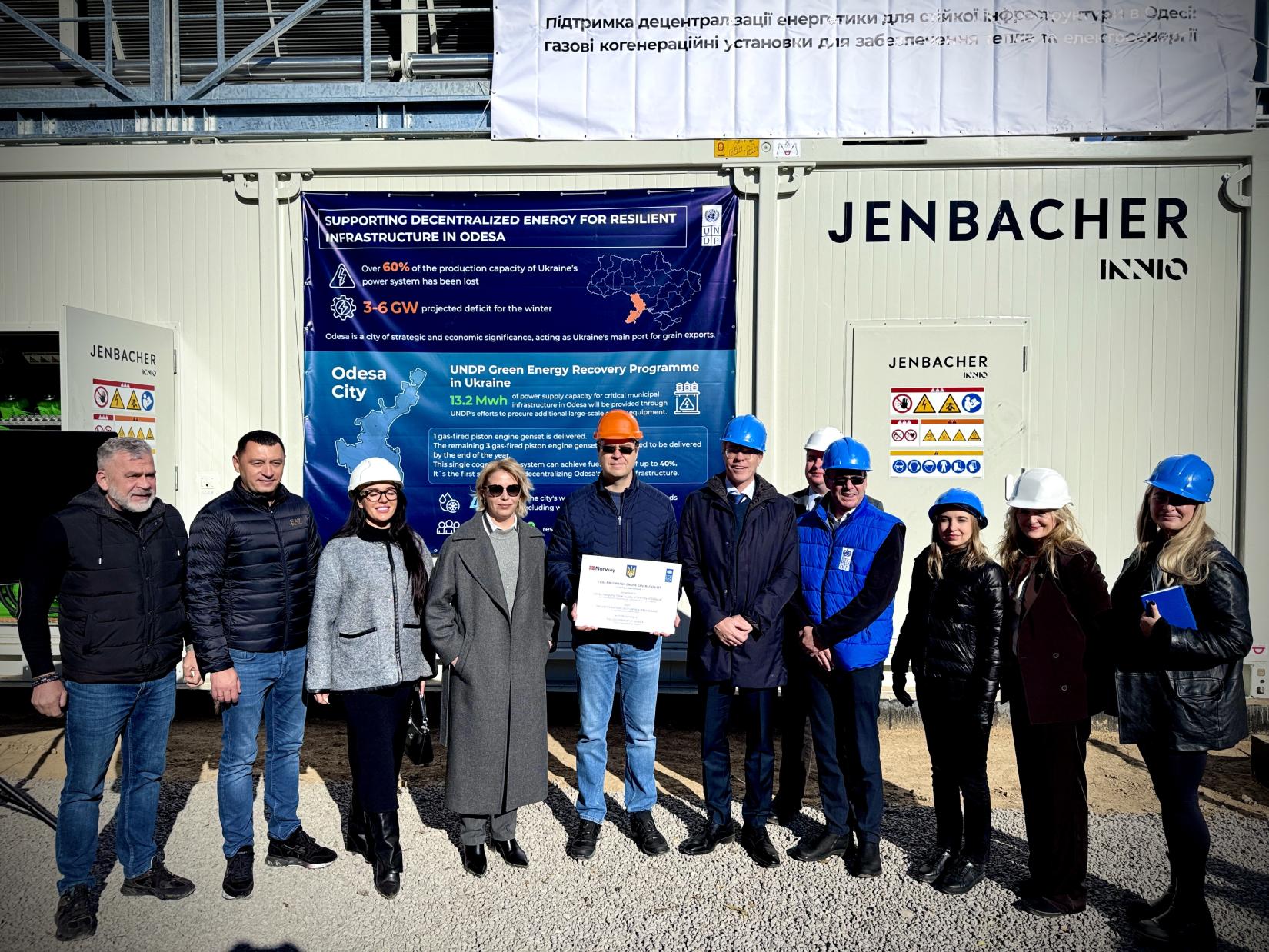Gas-piston cogeneration units delivered to Odesa by UNDP to cover 45% of city’s energy needs for water, heating, and sewage services
06 November 2024

Odesa, 6 November 2024 — The United Nations Development Programme (UNDP) in Ukraine is delivering gas-piston cogeneration units under its Green Energy Recovery Programme to help the city of Odesa meet its critical energy needs. The equipment is being supplied thanks to the support of the Governments of Japan, Norway, and Sweden.
Representatives of these countries presented one cogeneration unit at a handover ceremony on 6 November. Used in combination with three more units currently in transit, the equipment will boost the city’s generation capacity by 13.2 MWh. The added capacity is expected to benefit approximately 450,000 residents and cover 45% of Odesa’s energy needs for water, heating, and sewage services (excluding water intake).
In a video message, Masashi Nakagome, Ambassador of Japan to Ukraine, reiterated Japan's commitment to assisting Ukraine through the upcoming winter. “The handover of a gas-piston cogeneration unit to Odesa today, in collaboration with UNDP, Sweden, and Norway, is a testament to Japan’s strong commitment to supporting Ukraine’s energy sector,” Ambassador Nakagome said. “Japan stands with Ukraine and will continue to work closely with its people,” the ambassador said.
Martin Åberg, Ambassador of Sweden to Ukraine, also in a video address, condemned Russian attacks on civilian energy infrastructure and emphasized Sweden’s ongoing support for Ukrainian cities. “We understand the importance of the energy sector for Ukraine’s defence, economy, and population,” Ambassador Åberg said. “Part of our commitment involves collaborating with UNDP and other partners to deploy backup power generators in large urban centres, ensuring residents have access to essential services like water, heating, and sanitation during winter. The significance of these communal services in a city with half a million people cannot be overstated.”
During the event, Jan Flæte, Charge d’Affairs and Deputy Head of Mission at the Royal Norwegian Embassy in Ukraine, expressed admiration for the workers dedicated to restoring Odesa’s critical infrastructure, adding that “Norway stands firmly with Ukraine, providing essential support to ensure cities have access to the heat and light needed for resilience.”
“By supporting critical energy infrastructure and production capacities, we’re helping hospitals, schools, and other essential facilities across Ukraine function reliably, thereby enhancing safety and quality of life,” Flæte said.
Mykola Kolisnyk, Deputy Minister of Energy of Ukraine, expressed his gratitude to UNDP and the governments of Japan, Norway, and Sweden for their provision of equipment to the city of Odesa.
“These measures are critically important and align with the government’s strategic priorities for developing distributed energy generation across the country,” Kolisnyk said. “These swift, practical, and effective solutions address the unique challenges posed by wartime conditions. We’re grateful to our international partners for their support. The installation of this equipment will help us meet consumer needs during this heating season and in the future. We remain committed to advancing distributed generation projects in all regions of Ukraine.”
Hanna Pozdnyakova, Deputy Mayor of Odesa responsible for Housing and Communal Services, noted that Odesa has been subjected to continuous infrastructure attacks for over two years. “A key challenge for our city is the lack of internal power generation, which has resulted in prolonged blackouts, leaving residents without electricity for days at a time,” she said. “This equipment is therefore immensely valuable – it marks the first step in implementing a project to establish distributed generation in Odesa, ensuring reliable access to heat, electricity, and water for residents.”
Jaco Cilliers, UNDP Resident Representative in Ukraine, reaffirmed UNDP’s commitment to supporting the Ukrainian government and cities in maintaining an uninterrupted electricity supply. “We understand the challenges of the coming winter and remain dedicated to aiding Ukraine and Odesa in their recovery efforts,” Cilliers said. “By positioning these units directly where energy is needed, we can reduce fuel consumption by up to 40% for each unit. This initiative marks a crucial step in decentralizing and strengthening Odesa’s energy infrastructure. Through the Green Energy Recovery Programme, UNDP will continue working alongside partners to rebuild and enhance essential services in Odesa, reinforcing resilience and promoting sustainable energy solutions.”
Background:
The UNDP Green Energy Recovery Programme in Ukraine, supported by international partners, addresses Ukraine’s urgent energy needs during the ongoing attacks on the critical energy infrastructure and focuses on two main priorities: urgently ensuring the continuous operation of critical energy infrastructure and production capacities, and implementing strategic actions to accelerate the transition to green energy, particularly through a decentralized energy generation system (developing safe, distributed generation). The activities of the Green Energy Recovery Programme in Ukraine are funded by the governments of Japan, Norway, Sweden, Denmark, the Republic of Korea, Belgium, Germany, and Iceland.
UNDP is the leading United Nations organization fighting to end the injustice of poverty, inequality, and climate change. Working with a broad network of experts and partners in 170 countries, UNDP helps nations to build integrated, lasting solutions for people and planet.
Media enquiries:
Yuliia Samus, UNDP Ukraine Head of Communications. Email: yuliia.samus@undp.org



